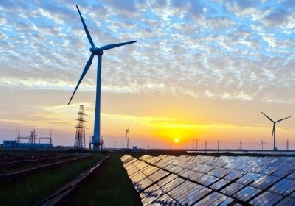Mining giant, AngloGold Ashanti Ghana has called for policy incentives from government to enable players in the mining sector to embrace renewable energy.
The world is moving towards clean energy with the US and Europe working on 2030 targets aimed at reducing emission of greenhouse gases.
Speaking to Starr News at the ongoing 2023 Ghana Mining and Energy Summit here in Accra, Principal Electrical & Energy Advisor for AngloGold Ashanti, Kisman Eghan speaking on a panel discussion on “Renewable and Clean Management in Ghana-Ghana’s Net Zero Goal” charged government to roll out initiatives to make it easier for firms to switch to clean and renewable energy in line with the Paris agreement on climate change.
“Policy backed by strong regulation will create the enabling environment for investors and other players in renewable energy. There must also be some tax rebate or policy incentives to entice prospective investors,” Mr. Eghan stated.
Mr. Kinsman Eghan assured the mining sector is committed to decarbonizing their operations to help fight climate change.
However, the capital intensive nature of renewable energy poses a challenge to players in the sector to independently switch to clean energy.
“In fact the cost of renewable energy is very high. So either you fund it yourself as a business or you go through the utility companies or consider a partnership with other firms or businesses in your sector to overcome financial barrier,” he added.
According to him, the short lifespan of some mining concessions makes it imperative for collaborations to pool resources together in creating a renewable energy power pool.
“When you choose the utilities route for example, the Utility company will require some Power Purchase Agreements (PPAs) over a long period like 25 years. If your life of mine is commensurate with the time they are giving you then that’s fine but if it’s not then that’s where you will need partnership with other mining companies to match up to the period of the PPA as well as share the costs,” he said.
According to Mr. Eghan, mining firms in Ghana have done such collaborations in the past expressing hope of a similar move in the future towards renewable energy.
“We have collaborated with other mining firms before. We did the MRP where four mines came together with one interest. So a number of mining companies can come together for the establishment of an X megawatt solar plant in the Northern part of Ghana and then we share according to our contribution. Such an arrangement would earn us carbon credits,” he concluded.
Ghana in its Renewable Energy Master Plan 2019 aims to achieve the following by 2030: Increase the proportion of renewable energy in the national energy generation mix from 42.5 MW in 2015 to 1,363.63 MW (with grid-connected systems totaling 1,094.63 MW).
Business News of Saturday, 10 June 2023
Source: starrfm.com.gh













